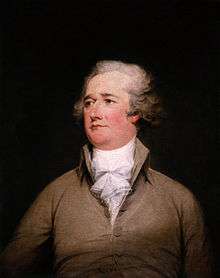Federalist No. 66

Federalist No. 66 (Federalist Number 66) is an essay by Alexander Hamilton and the sixty-sixth of The Federalist Papers. It was published on March 8, 1788 under the pseudonym Publius, the name under which all The Federalist Papers were published. The title is "Objections to the Power of the Senate To Set as a Court for Impeachments Further Considered".
In this paper, Hamilton addresses specific objections to the power of the Senate to try impeachment cases, a discussion that is continued from the previous paper.
Background
The Federalist Papers, written by Alexander Hamilton and his colleagues John Jay and James Madison, were written in the late 1780s to argue in favor of the ratification of the United States Constitution to replace the Articles of Confederation, which served as the first form of a Constitution for the newly freed country. The Federalist Papers were directed towards the anti-federalists, those who opposed a stronger central government (especially the New York anti-federalists), both to persuade them and to persuade undecided citizens to ratify the Constitution.The first Federalist Paper was published on October 27, 1787 in the New York Independent Journal. The essays argued that the proposed government would preserve the Union and give power to the federal government to act on the interest of the nation.
Publication
Federalist Paper 66 was written by Alexander Hamilton who represented New York in the Congress under the Articles of Confederation and had served as a deputy from New York at the Constitutional Convention in 1787. It was titled "Objections to the Power of the Senate To Set as a Court for Impeachments Further Considered" and was published on March 8, 1788 in n the New York Independent Journal under the pseudonym Publius.
Anti-Federalist Response
There were 3 different responses for the Anti-Federalist Paper. The people who responded were Mr. Joseph Taylor, Mr. William Porter. Mr. Timothy Bloodworth. One of the responses is that none can impeach but the representatives; and the impeachments are to be determined by the senators, who are one of the branches of power which we dread under this Constitution. Another response is that United State shall undoubtedly, for instance, have a great number of tax-gatherers. If any of these officers shall do wrong, when we come to fundamental principles, we find that we have no way to punish them but by going to Congress, at an immense distance, whither we must carry our witnesses. Another response was that the people wished to be informed, whether this sole power of impeachment, given to the House of Representatives, deprived the state of the power of impeaching any of its members.
Hamilton's Argument
Hamilton structures his argument as a series of rebuttals to various anti-Federalist arguments about the Senate having the power to impeach, and also about the Senate's potential to overreach its power. Under the Constitution, the House of Representatives has the power to impeach a government official, in effect serving as prosecutor. The Senate has the sole power to conduct impeachment trials, essentially serving as jury and judge. Since 1789 the Senate has tried seventeen federal officials, including two presidents. The first argument he rebuts is the idea that if the Senate acts as a court for impeachments, it encroaches on the power of the judicial branch. He argues that some intermixture of minor forms of power is necessary to prevent greater abuses, and that allowing the Senate to serve as an impeachment court checks and balances the powers of the President and is worth the small encroachment on the power of the Supreme Court.The second argument Hamilton states is that the senate could gain so much power that they could become aristocratic. Hamilton felt that if the senate was given more power than what they have now, then the senate would be able to control too much of the government.The third argument states that "the senators will not be able to impartially judge presidential appointees who they once voted to confirm". Hamilton states that this would allow the senate to be bias and " "evidences of guilt so extraordinary".The last argument is that senators will not be able to impartially judge themselves for the role they play in the ratification of foreign treaties". The senate and not appoint themselves for the position of dealing the foreign treaties. Hamilton felt that this would allow for an unbiased decision when it came to making treaties.
Modern Day Analysis
In contemporary time, The Federalist Papers are admired for its insights into human nature and the character of republican government. It was likewise praised for its easily understood review of the proposed Constitution's provisions and its persuasive arguments for their efficacy. These papers helped everyone understand why Hamilton, Madison and Jay wanted the Constitution to ratified and what they wanted it to look like.
External Links[edit]
https://www.congress.gov/resources/display/content/The+Federalist+Papers#TheFederalistPapers-66
http://www.senate.gov/history/powers.htm
http://www.gradesaver.com/the-federalist-papers/study-guide/summary-essay-66
http://www.senate.gov/artandhistory/history/common/briefing/Senate_Impeachment_Role.htm
https://muse.jhu.edu/article/594932
https://www.cliffsnotes.com/literature/f/the-federalist/summary-and-analysis/section-x-united-states-senate-federalists-no-62821166-madison-or-hamilton
https://papers.ssrn.com/sol3/papers.cfm?abstract_id=969675
http://poseidon01.ssrn.com/delivery.php?ID=831111064100005088105084016099099110060043028048003056002082105099098092123020114105097043100107049008028113084090014001127052040021008010098075005106115028007050022004079071117100075067071067100028092092091065011010003118089073013088072085105098&EXT=pdf